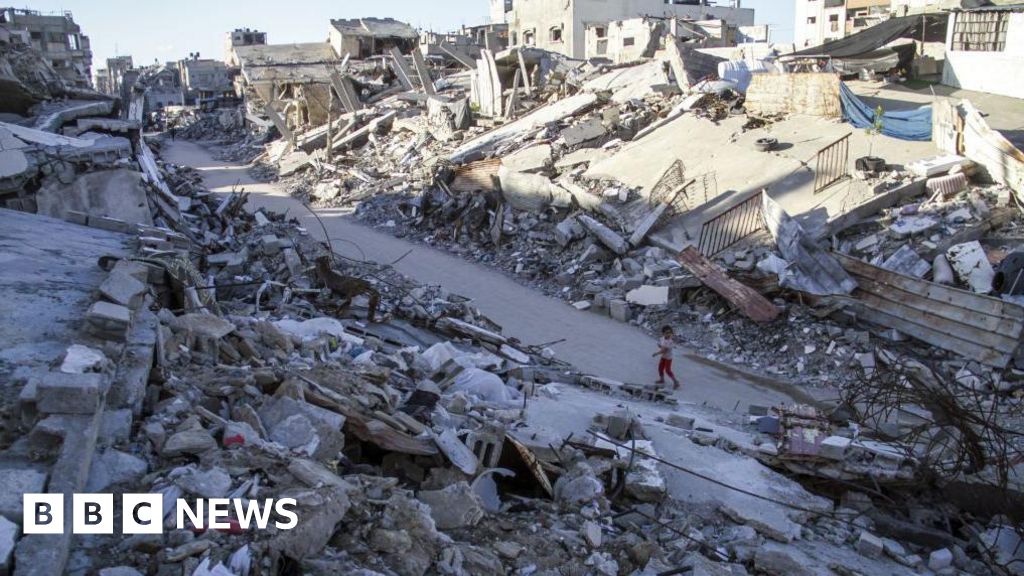
An Israeli air strike has killed at least 33 people including 21 women at a refugee camp in northern Gaza, the strip’s Hamas-run authorities say.
There was no immediate comment on the reported attack at Jabalia from Israel, whose forces have been besieging the densely-populated camp for weeks.
The killing of Hamas leader Yahya Sinwar this week raised hopes in some quarters of an end to the war but the group’s deputy leader said Hamas would only be strengthened.
US President Joe Biden has said there is a chance of “working towards a ceasefire” in Lebanon, where Israel is fighting Hezbollah militants, but it will be “harder in Gaza”.
He was speaking as he left the German capital Berlin, where he had met German, French and British leaders.
According to a statement from Gaza’s Hamas-run government media office, Friday’s air strike also injured more than 85 people, some seriously, as homes belonging to three families in the camp were hit.
The final death toll could reach 50, it added, as people were buried under the rubble of buildings.
The report could not be verified independently. Local sources indicate that northern Gaza is effectively isolated, with telecommunications and internet services severed in the region.
A video circulating on social media – which the BBC has not verifed – appears to show bodies wrapped in white shrouds laid out in the courtyard of al-Awda Hospital.
The director of the hospital spoke to reporters about an overwhelming influx of casualties.
“Ambulance crews are still attempting to retrieve the martyrs and the wounded from Jabalia,” the director said.
“Our hospital wards are completely full and many injured individuals are receiving treatment on the floor.”
According to Reuters news agency, the Hamas-run health ministry in Gaza said at least 39 Palestinians, many in Jabalia, had been killed by Israeli strikes on Friday before the latest attack.
About 400,000 people have been trapped inside the camp with little food or water for more than two weeks.
The head of the UN’s Office for Humanitarian Assistance, Georgios Petropoulos, told the BBC’s Newshour programme that families in Jabalia were enduring “atrocious conditions”.
“We can’t hit the alarm bell hard enough about how dire and dangerous the situation for civilians there is,” he said, speaking from Rafah in southern Gaza.
Israel said it had sent about 30 lorries of supplies into northern Gaza on Friday including food, water, medical supplies and shelter equipment but local health officials told Reuters aid had not been reaching the worst-affected areas such as Jabalia.
Israel has repeatedly denied it is preventing humanitarian aid from entering Gaza but the US has told it to boost access or risk having some US military assistance cut off.
An Israeli minister, Amichai Chikli, told the BBC that Israel had “blockaded” parts of northern Gaza, which include Jabalia.
“We allowed the civilian population to escape into the safe zone, and we prevented supplies to enter the blockade region,” he told the Newshour programme.
He insisted this was “legal according to the international law”.
Since the Hamas-led attack on Israel just over a year ago, at least 42,500 people have been killed and tens of thousands injured in Gaza, the Hamas-run authorities say.
About 1,200 people were killed by Hamas and its allies in the 7 October 2023 attack and 251 others were taken to Gaza as hostages.
On Friday Hamas deputy leader Khalil al-Hayya said Israeli hostages would not be returned until Israel ended the war and withdrew from Gaza.
Sinwar was held responsible for the 7 October attack. According to the Israeli military, he was killed in a firefight after the building where he was hiding in the southern Gaza city of Rafah was struck with “tank fire”.
The pathologist in Israel who conducted his autopsy told US media he had been shot in the head.
Dr Chen Kugel also found injuries to his right forearm from “missile fire”, a damaged left leg from “fallen masonry” and shrapnel injuries.
